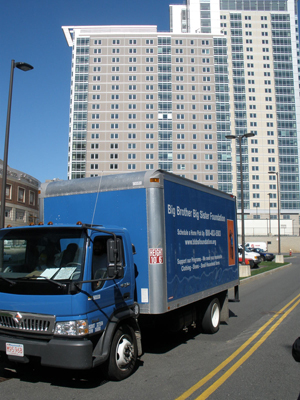Seven Tons of Rescued Clothes
BU recycling effort benefits Big Brother Big Sister

Imagine receiving a care package with seven tons of goodies.
That’s what BU’s dorm residents gave at the end of the last school year to the Big Brother Big Sister Foundation, which then sold the donated shirts, shoes, and pants, siphoning the proceeds into the organization’s local programs.
“You look at the piles at the end of the year and it’s just phenomenal what people throw away,” says Dennis Carlberg, the University’s sustainability director, whose mantra is reduce, reuse, recycle. “If we can give it to someone to reuse, that’s a lot better than recycling it or putting it in the trash.”
Boston University teamed up with the Big Brother Big Sister Foundation for the first time last May, joining several Boston-area universities, including Wellesley College, Boston College, and Emerson University, in encouraging students to donate clothing and shoes.
Ken Higgins, the foundation’s dispatch supervisor, says students share a willingness to help local children and protect the environment. “The BU kids got a whiff of it and really accepted it,” Higgins says.
After years of seeing clothing fill dumpsters, Michael Lyons, senior buyer for Facilities Management and Planning, got more than upset — he got proactive. He met with Residence Life staffers to discuss how the material, fine to wear if no longer in fashion, could be rescued and reused.
Lyons and his team looked into several nonprofit organizations before deciding to go with the Big Brother Big Sister Foundation, whose blue trucks pick up donations for free.
Goodwill Industries International, founded by Rev. Edgar J. Helms (STH 1893, Hon.’40), was another possibility, but lost out because it does not pick up donated items.
Coordinating the effort in one week posed the biggest challenge. Carlberg’s office provided signs for drop-off locations at most residence halls, and resident assistants spread the word. Foundation trucks made a campus sweep every other day from May 4 through 19 to collect donated items.
On short notice, 6.75 tons of goods isn’t a bad snag. “Overall, it was very successful, and you learn as you go,” Carlberg says.
Those same items would most likely have been incinerated as trash. The University annually pays Waste Management almost $1 million for garbage collection and removal. The disposal cost of those tons of clothing and shoes would been less than $500, Lyons says, but pinching pennies isn’t the point.
“I think the real key is that the material got to a needy organization,” he says.
Donated clothing and shoes are brought to the foundation’s 25,000-square-foot warehouse in Holbrook, where they are boxed and sent by tractor-trailers throughout the United States and Canada to large thrift store chains such as Savers.
The Big Brother Big Sister Foundation is paid per pound of goods sold. Suddenly what would have been trash is transformed into cash. All told, the organization netted $4,000 to $5,000, according to executive director Steve Beck. “That’s one of the cool things we do,” he says. “We don’t ask you for money; we ask you for your shoes and clothing.”
That money pays the foundation’s operational costs and funnels back to programs that help provide adult mentors for more than 5,000 children throughout greater Boston.
Beck would love to see the program spread to every regional college. Next year, the foundation plans to launch a spring break jeans drive; every student who donates a pair will be entered into a raffle for a free trip. Carlberg is not yet sure of the destination, but he’s thinking Cozumel or Cancún.
As for BU, Carlberg wants to repeat the clothing round-up at the end of this school year. “This is something we feel we really need to do,” he says.
Clothes may be what’s left behind as students move out, but Carlberg knows where he wants to focus for the next Move-in weekend: recycling cardboard.
Leslie Friday can be reached at lfriday@bu.edu.
Comments & Discussion
Boston University moderates comments to facilitate an informed, substantive, civil conversation. Abusive, profane, self-promotional, misleading, incoherent or off-topic comments will be rejected. Moderators are staffed during regular business hours (EST) and can only accept comments written in English. Statistics or facts must include a citation or a link to the citation.